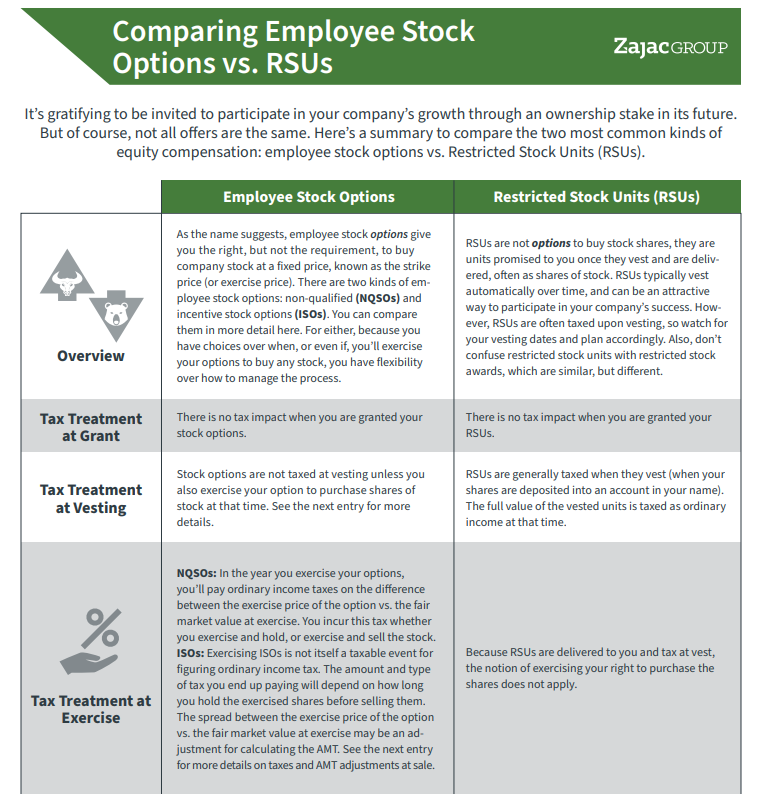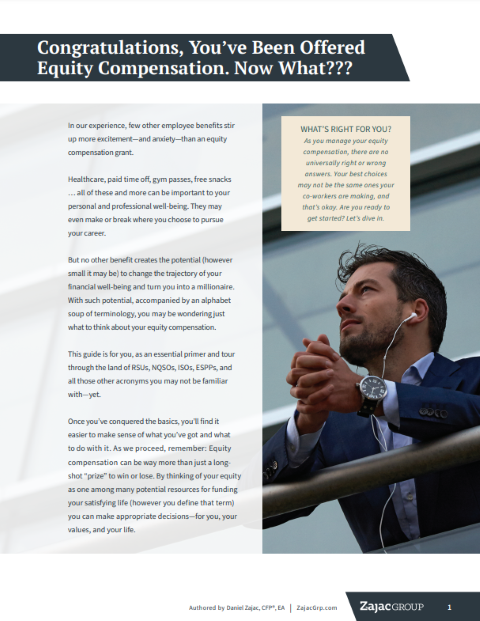Some companies offer employee stock grants as part of a compensation package to help attract, retain, and reward key employees.
Both the business and the employee share the hope that the stock price of the company will increase over time, which in turn can increase the success of the business and increase the wealth of the employee. The idea is this mutual benefit can translate into a joint desire to work hard and grow the company.
As an employee on the receiving end of stock grants, it’s important to take personal responsibility to understand how they fit into your financial plan. Because even though the company helps by giving you the stock grants, it is incumbent upon you to make the best of them.
Stock grants as compensation can be complicated. The more you dig into the details, the deeper the proverbial rabbit hole goes. But don’t be discouraged. By asking a few simple questions, you can better understand your stock grants and therefore begin making better decisions about how to best use them.
Here are 4 questions to ask your employer regarding your stock grants.
Question 1 – What Employee Stock Grants Did You Actually Receive?
The language surrounding employee stock grants gets confusing. You need to learn terms such as incentive stock option, non-qualified stock option, restricted stock, and employee stock purchase plan (to name a few).
COMPARISON GUIDE
Not All Stock Offers are the Same! Here's a helpful comparison between two of the most common employee stock options.
Not only that, but you often need to learn the corresponding acronyms: ISO, NSO or NQSO, RSU, and ESPP.
These names and acronyms are often used interchangeably in the course of casual conversation. However, each specific stock grant has it owns distinct advantages and disadvantages. More importantly, each type has different rules and regulations regarding when it’s taxed, how it’s taxed, and when you can do something about the taxes you could face.
This is why it is so important that you know exactly what you have. Do you have incentive stock options or do you have non qualified stock options? Or do you have restricted stock? Knowing what you have allows you to begin the planning process (because you can’t properly plan unless you actually know what you’re working with).
It’s not uncommon to have more than one type of employee stock grant. For example, you may have both incentive stock options and non qualified stock options — and you have to consider different things for each, because they don’t receive the same tax treatment.
Knowing precisely what you received is the number-one question to ask and understand the answer to when it comes to employee stock grants.
Question 2 – How and When Do Your Stock Grants Vest?
As mentioned above, the type of stock grant you receive can impact when your stock grants actually become yours. Vesting is the time between when you receive stock grants and when you can actually do something with said grants.
Prior to your stock grants vesting, they only remain a future promise to you; a promise that you cannot currently act on. Your employer has a big incentive to make that future promise, because they can use it to reward you for the company doing well — but also to keep the golden handcuffs on you.
Here’s what I mean: let’s assume that you have 10,000 restricted stock units that vest in 3 years. Let’s also assume that the current market price of a share is $25.
This means that in 3 years when the shares vest (assuming no change in the market price), your shares are worth $250,000 ($25 per share times 10,000 shares).
If you leave the company now prior to the shares vesting, you will forfeit your right to the unvested shares. You will leave with nothing and knowingly give up the right to a future promise of $250,000.
That promise (or, more accurately put, that hope) is what leaves many employees feeling like sticking with the company that provides stock grants is worth it, even if there is an otherwise great opportunity elsewhere on the table.
Vesting can happen in a number of ways, but it usually happens over the course of several years. For example, you may have shares vest at 25% each year for 4 years beginning 1 year after the shares are granted.
To determine exactly what your vesting schedule is, ask for a copy of your plan document. A plan document details the specific rules that pertain to your stock grant.
Question 3 – How and When Are Your Employee Stock Grants Taxed?
When you receive employee stock grants as part of a compensation package, it’s important to consider the tax impacts of the grants you have. The specific tax rules for each type vary, and not understanding this can lead you to make critical errors that leave you paying more in taxes than you should have..
Let’s explore a few key stock grant types, and when they are taxed:
- Restricted Stock Units – In most cases, restricted stock units are taxed when the units vest. You are taxed on the total value of the shares as of the vesting date.
- Non-Qualified Stock Options – Generally speaking, NSOs are taxed when you exercise the shares, not when they vest. This ability to exercise when you want gives you some control over when you have to handle the pending tax impact.
- Incentive Stock Options – You are usually taxed when you exercise the incentive stock option. You are also taxed when the shares are sold in final transaction. The exact tax of ISOs includes the alternative minimum tax (AMT), the AMT credit, long-term capital gains, and qualifying holding periods.
- Employee Stock Purchase Plans – For the most part, you are taxed when you sell your ESPP shares. You pay tax on the discount you received as well as any gain above and beyond the purchase price date. The details of how you are taxed is dependent upon how long you have held the stock.
If you know what type of stock grant you have, you can start planning for the pending tax. And while tax should not be the only factor in when and what you do with your stock grants, it should be an important consideration.
In fact, income tax may have a material impact on the after-tax amount you receive from a sale of your stock grants. This decision may further impact how much of your net worth you have in a concentrated equity position.
Question 4 – Do You Have a Plan for Concentrated Risk?
Stock grants can be a fantastic (but not promised) way to generate substantial wealth. You may be an early-stage employee at a growing pre-IPO startup, or you may be a long-term employee who has benefited from years and years of stock grants.
Whatever the time frame and whatever the situation, review how much of your net worth is made up of stock grants from your company. One rule of thumb suggests that no more than 10-15% of your net worth should be in one company stock — especially if it’s the one you work at. Not only are your assets tied to the performance of that business, but your income is, too.
Other personal factors that may influence your decision to have a substantial position in one company may include your timeline to retirement, your risk tolerance, or your ability to sell or not. (Pre-IPO stock may not have a liquid market to sell and corporate insiders or other executives may be locked up for other reasons.)
A plan to sell some or all of your stock grants should be balanced with your other assets, your goals, and your objectives. A good plan will start early and be reevaluated often in light of changing finances and changing market prices.
What to Consider Next for Your Employee Stock Grants
Stock grants can be very confusing to even the most trained eye. The rules and regulations for each type of stock grant are complicated. Combine these into a plan that has multiple types of stock grants and multiple awards over many years, and the possibilities are endless.
Often a first step to getting this organized is to ask a few key questions about what you have, when you have it, how its taxed, and how it fit into your financial plan. A lot of this can be done with simple questions to the right people.
Once you have the information, you should use it to develop a plan and a strategy to meet your goals. A good strategy is one that meets both your short- and long-term goals while having an eye towards tax, risk, and financial needs.
If you find yourself paralyzed by the complexity of it all, you may want to seek out the resources of a qualified professional.










0 Comments